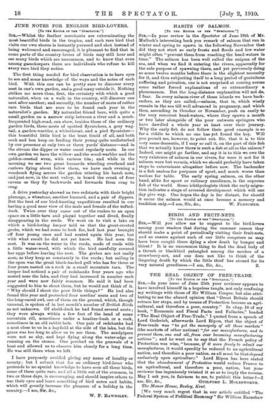JUNE NOTES FOR ENGLISH BIRD-LOVERS.
[TV TIE EDITOR. or TIE "SPECTATOR"] Siva—Whilst the feather merchants are exterminating the most beautiful birds in the tropics, and each rare bird that visits our own shores is instantly pursued and shot instead of being welcomed and encouraged, it is pleasant to find that in some parts of the country lovers of birds may still hear and see many birds which are uncommon, and to know that even among gamekeepers there are individuals who refuse to kill every rare bird they notice.
The first thing needed for bird observation is to have eyes to see and some knowledge of the ways and the notes of each bird. With this one can be pretty sure to discover every neat in one's own garden, and a good many outside it. Nothing strikes me more than, first, the certainty with which a good naturalist, when on a walk in the country, will discover one nest after another; and secondly, the number of nests of rather rare birds that are sure to be found each year in the naturalist's garden.. My naturalist friend here, with quite a small garden on a narrow strip between a river and a much- frequented high-road, can show, besides those of the ordinary garden birds, three nests of spotted flycatchers, a grey wag- tail, a garden-warbler, a whitethroat, and a pied flycatcher— this beautiful little bird is the least timid of all, and both cock and hen keep on feeding their young quite undisturbed by our presence at only two or three yards' distance—and in the stream the dipper or water ouzel regularly nests. In our own garden we have the willow- and the wood-warbler and the golden-crested Wren, with various tits ; and while in the morning we see two great buzzards wheeling overhead and curlews flying about below them, we have each evening a woodcock flying across the garden uttering his harsh note, and just now, in the next valley, is heard the croak of four ravens as they fly backwards and forwards from crag to crag.
A drive yesterday showed us two redstarts with their bright plumage, a wheatear, another buzzard, and a pair of dippers. But the best of our bird-hunting expeditions resulted in our having a good near view of the male and female of the tufted- dnek. Twice over they came out of the rushes to an open space on a little tarn and played together and dived, finally disappearing in the reeds. We went on to visit a lake on which a bird loving keeper told us that the great-crested grebe, which we had come to look for, had last year brought off four young ones and had nested again this year, but with what result he did not yet know. He had seen the nest. It was on the water in the reeds, made of reeds with a little water-weed, with which the bird carefully covered her eggs before leaving the nest. The grebes are not easily seen, as they keep so constantly in the reeds ; but sailing in the open was the great black-backed gull who has for three or four years nested on a rock in a small mountain tarn. The keeper had noticed a pair of • redshanks four years ago who nested near the lake, and they had increased in number each year and were now fairly common. He said it had been suggested to him to shoot them, but he would not think of it. " Why should I shoot the poor little things ? " He had also found this year and protected four merlins' nests and two of the long-eared owl, one of them on the ground, which, though unusual, is spoken of in last month's number of British Birds as not unknown. Of sheld-duck he had found several nests ; they were always within a few feet of the head of some mountain rill, sometimes under a heather-bush or a rock, sometimes in an old rabbit-hole. One pair of redshanks had a nest close to us in a hayfield at the side of the lake, but the grass was too long to allow us to see them. The sandpipers were not so shy, and kept flying along the water-edge or running on the stones. One perched on the gunwale of a boat and allowed us to observe him closely for a long time. He was still there when we left.
I have purposely avoided- giving any name of locality or county ; but I submit that for an ordinary bird-lover who pretends tono special knowledge to have seen all these birds, some of them quite rare, and all a little out of the common, in two or three days, is encouraging, and should inspire others to use their eyes and learn something of bird notes and habits, which will greatly increase the pleasure of a holiday in the country.—I am, Sir, &c., W. F. RAWNSLEY.


















































 Previous page
Previous page